Part 1: Creating Linkable High Quality Content
In the introduction, we explained that linkable, well-crafted content is that which is specifically geared towards helping you build links to your website. But let’s step back for a moment and explain what exactly quality material is. High-quality content is made up of:- Well-researched and accurate information
- Extremely valuable material designed for your target audience
- Impeccably-written copy
- Supplemental images, graphs, videos or infographics
- The most complete and up-to-date information at the time of publishing
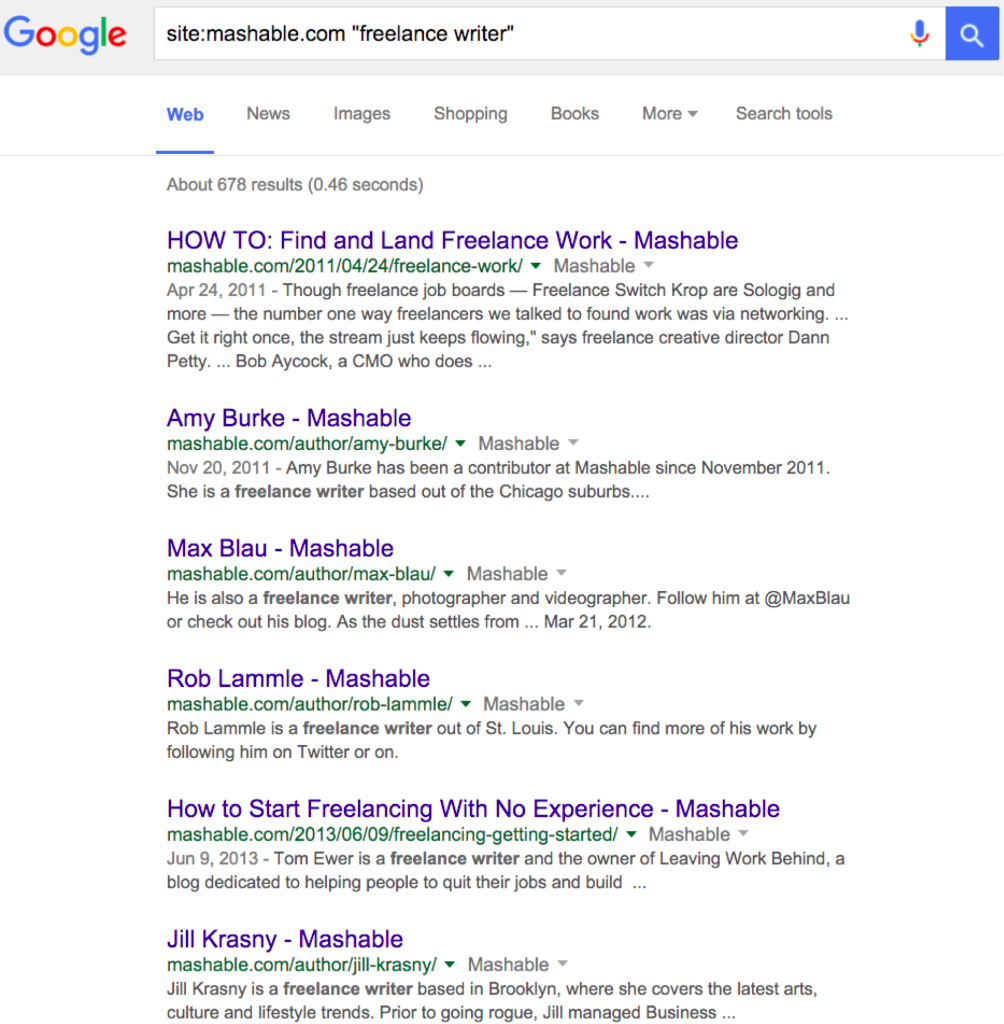 This search will give you the top writers in your niche along with some samples from their portfolio, which you should definitely read to ensure that their style of writing is appropriate for your brand. Run the search for sites that produce the type of content you are looking to create in order to find writers who already have a handle on the topic and are experts at crafting high-quality content.
Once you have hired someone to create some really cream-of-the-crop writing, it’s time to add the elements that will transform it into linkable material. Here are the elements that you will need in your content and how each will help you get links:
This search will give you the top writers in your niche along with some samples from their portfolio, which you should definitely read to ensure that their style of writing is appropriate for your brand. Run the search for sites that produce the type of content you are looking to create in order to find writers who already have a handle on the topic and are experts at crafting high-quality content.
Once you have hired someone to create some really cream-of-the-crop writing, it’s time to add the elements that will transform it into linkable material. Here are the elements that you will need in your content and how each will help you get links:
Research
It’s one thing to say that Facebook is the most popular social network on the planet, but without the numbers to back it up, it just comes off as opinion. But when you write that with 1.55 billion active monthly users, 83.5% of which are outside of the US and Canada, Facebook is the most popular social network on the planet, this is no longer opinion; it’s fact-based writing with the statistics to back it up. This is what separates the experts from the amateurs.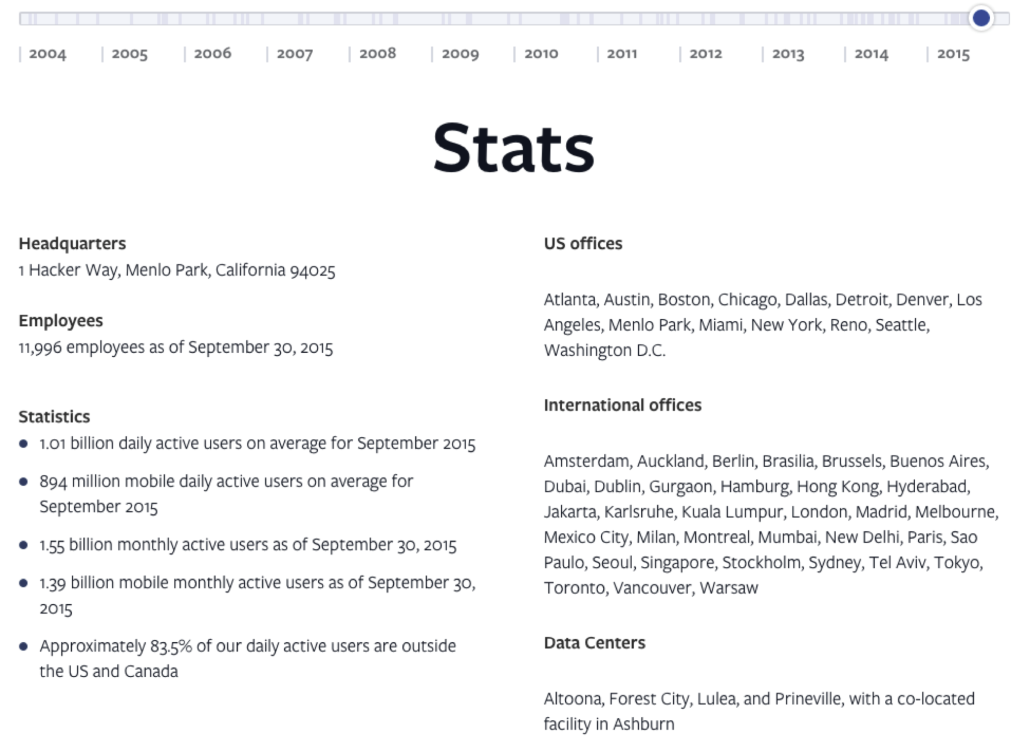 Cite specific sources for every one of your claims throughout your article so that readers instantly get that they are looking at a well-researched piece of content. This gives them a reason to trust you and link to your content rather than content written by others. It also allows the readers to dive deeper into the subject to which you sourced if that interests them.
Cite specific sources for every one of your claims throughout your article so that readers instantly get that they are looking at a well-researched piece of content. This gives them a reason to trust you and link to your content rather than content written by others. It also allows the readers to dive deeper into the subject to which you sourced if that interests them.
Expert Opinions
Another way to add credibility to your writing is by using quotes. For example, I could say that link-building methods of the past will no longer help your website. But again, that’s just opinion, and unless you already consider me an expert, you won’t necessarily pay heed to it. On the other hand, if I say that John Mueller of Google suggests that webmasters should focus less on link building as it’s been done in the past and instead focus more on creating high-quality content that is easy to link to, I have now added expert opinion from Google, a source that most people trust. All the better if I can use word-for-word quotes that are hyperlinked to the source. Even if someone has never heard the name John Mueller, the fact that he is from Google makes him an instant expert in the area of SEO. When you can’t find specific research or statistics, expert quotes are the next best thing to back them up. In addition to making your content higher quality by adding in expert opinion, you have also added influencers to the article who might actually help you promote it. Even if Mueller doesn’t link to your content, he might share it with his 14.4k Twitter followers, which may in turn prompt one of his fans to share it with their own audience or link to your content.Resources
Last, but not least, are resources. Look for opportunities throughout your content to mention specific resources. For example:- Don’t just say that people should try various SEO tools. Recommend your favorites, like SEMrush for paid search advertising research and Monitor Backlinks for link profile monitoring.
- Don’t just say there are tons of great beginner’s guides to SEO. Provide a few examples, like Moz’s Free Beginner’s Guide or Buffer’s Complete Beginner’s Guide.
- Don’t just say there are lots of SEO experts. Mention the ones that you frequently refer to, like Bruce Clay, Loren Baker, Dr. Pete Meyers, and John Rampton.
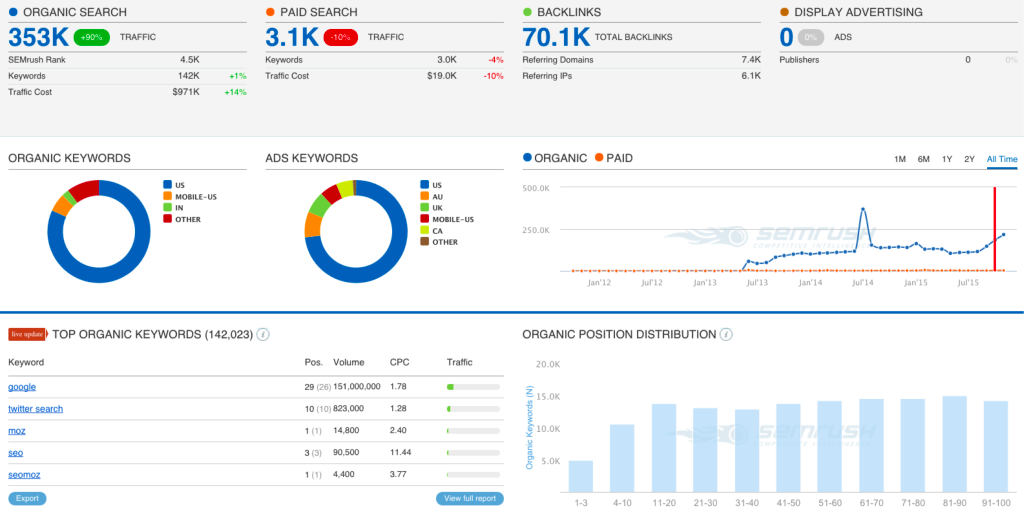 For the average reader, this adds more value to your content because you are giving them additional resources that provide substantial information. Remember, you’ll stand out from the competition by doing this because so few people take the time to give their readers this kind of value.
You have also added more opportunities to connect with people to let them know that you have featured them, their resource or their product in your latest piece of content. Resulting shares based on “ego-baiting” (creating content that features an influencer for the purpose of getting a link or share from them in return) have the potential to result in links.
For the average reader, this adds more value to your content because you are giving them additional resources that provide substantial information. Remember, you’ll stand out from the competition by doing this because so few people take the time to give their readers this kind of value.
You have also added more opportunities to connect with people to let them know that you have featured them, their resource or their product in your latest piece of content. Resulting shares based on “ego-baiting” (creating content that features an influencer for the purpose of getting a link or share from them in return) have the potential to result in links.
Part 2: Building Links to Your Linkable High Quality Content
Once you’ve published your linkable high-quality content, your next goal is to actually build links to it. You’re going to do that in 4 steps:- Playing the numbers game
- Getting as much exposure for your content as possible
- Reaching out to the people most likely to link to your content
- Answering questions
Numbers
The first step is playing the numbers game. The number of social shares, the number of votes, and the number of comments you receive on your content all play a role in convincing people that your piece is valuable, popular and, ultimately, link worthy. This is why the second after you publish your content you need to start building up these numbers. Begin by sharing it to all your social media networks. Then encourage those social shares to increase by using networks like Fiverr, ViralContentBuzz, JustRetweet, and CoPromote. All these sites offer ways for you to effectively pay for social promotion.
The key is to build up your numbers somewhat evenly across all networks. In other words, don’t buy 1,000 tweets and nothing else. Look to get an even distribution of tweets, likes, +1s, shares, stumbles, and pins.
Then get it on popular voting networks like Inbound.org for marketing content, BizSugar for business content, or subreddits for any kind of content. It’s best that you reach out to people you know on each of these networks in order to get votes on your content as soon as it gets published.
The faster the votes build up, the better the chances of it getting to the homepage and driving more traffic. Just don’t do anything like buy 100 votes for a network where the top content only has 20, or you’ll likely get bumped off the homepage for voting fraud.
Finally, get comments. You’ll want to aim for a little higher quality on these as you don’t want to encourage spam on your website. The best place to start is your own email list. Send out a broadcast announcing your post and at the end of the email provide a clear call to action: that people stop by and share their thoughts on your blog post. From there, try out the groups on Facebook that are built specifically for bloggers to reciprocate one good comment for another.
This is why the second after you publish your content you need to start building up these numbers. Begin by sharing it to all your social media networks. Then encourage those social shares to increase by using networks like Fiverr, ViralContentBuzz, JustRetweet, and CoPromote. All these sites offer ways for you to effectively pay for social promotion.
The key is to build up your numbers somewhat evenly across all networks. In other words, don’t buy 1,000 tweets and nothing else. Look to get an even distribution of tweets, likes, +1s, shares, stumbles, and pins.
Then get it on popular voting networks like Inbound.org for marketing content, BizSugar for business content, or subreddits for any kind of content. It’s best that you reach out to people you know on each of these networks in order to get votes on your content as soon as it gets published.
The faster the votes build up, the better the chances of it getting to the homepage and driving more traffic. Just don’t do anything like buy 100 votes for a network where the top content only has 20, or you’ll likely get bumped off the homepage for voting fraud.
Finally, get comments. You’ll want to aim for a little higher quality on these as you don’t want to encourage spam on your website. The best place to start is your own email list. Send out a broadcast announcing your post and at the end of the email provide a clear call to action: that people stop by and share their thoughts on your blog post. From there, try out the groups on Facebook that are built specifically for bloggers to reciprocate one good comment for another.
Exposure
The next step is exposure. The more people that you reach with your content, the greater the number of links you’re likely to get from them. The fastest way to get exposure with your target audience beyond simply sharing it on your social accounts is through social media advertising. Specifically, create ads for: Next, do some Twitter outreach by finding people who have shared similar content using the pro version of BuzzSumo.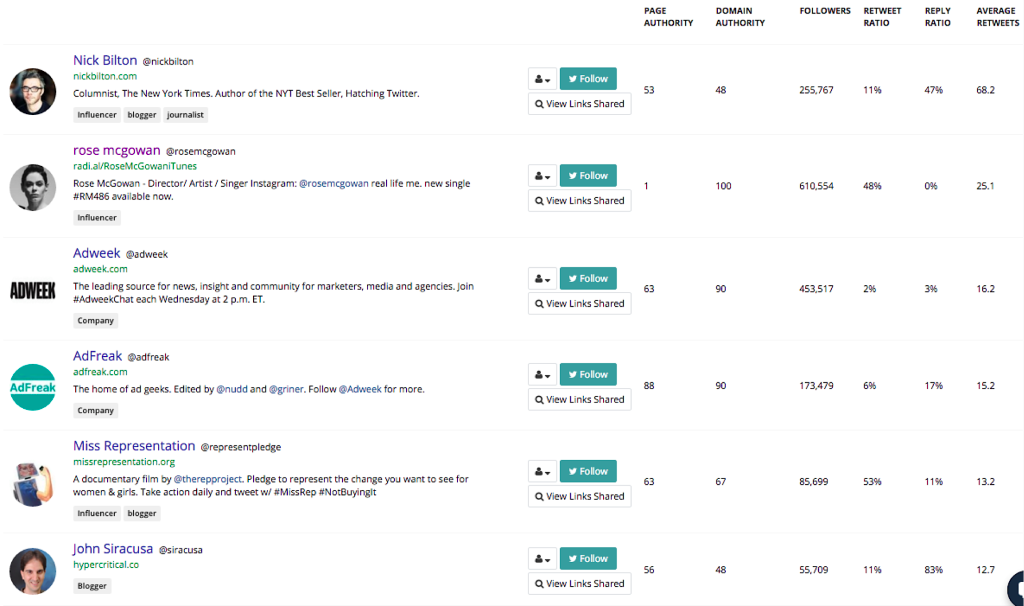 If you can find direct contact information for these people, trying emailing them. Otherwise, send them a simple tweet to let them know that you noticed they shared a particular post and that you have a good one on the same topic you think they’d be interested in. Start with those sharers who have the most followers and retweets and work your way down the list.
Just in case your outreach is ignored, you can also combine tactics by exporting lists of people from BuzzSumo who have shared similar content and then create Tailored Audiences for Twitter ads using their usernames. This is a great way to craft a relevant remarketing campaign for your target demographic.
Since Twitter takes a while to create Tailored Audiences, you might want to do this research prior to publishing your content so that your Tailored Audiences are ready when the content goes live.
If you can find direct contact information for these people, trying emailing them. Otherwise, send them a simple tweet to let them know that you noticed they shared a particular post and that you have a good one on the same topic you think they’d be interested in. Start with those sharers who have the most followers and retweets and work your way down the list.
Just in case your outreach is ignored, you can also combine tactics by exporting lists of people from BuzzSumo who have shared similar content and then create Tailored Audiences for Twitter ads using their usernames. This is a great way to craft a relevant remarketing campaign for your target demographic.
Since Twitter takes a while to create Tailored Audiences, you might want to do this research prior to publishing your content so that your Tailored Audiences are ready when the content goes live.
Outreach
Now it’s time to reach out directly to the people who are most likely to link to your content. These will typically be bloggers who are already linking to similar pieces. BuzzSumo also offers a feature that allows you to view the articles that link to this piece of content, so as you are viewing sharers, look at the linkers too.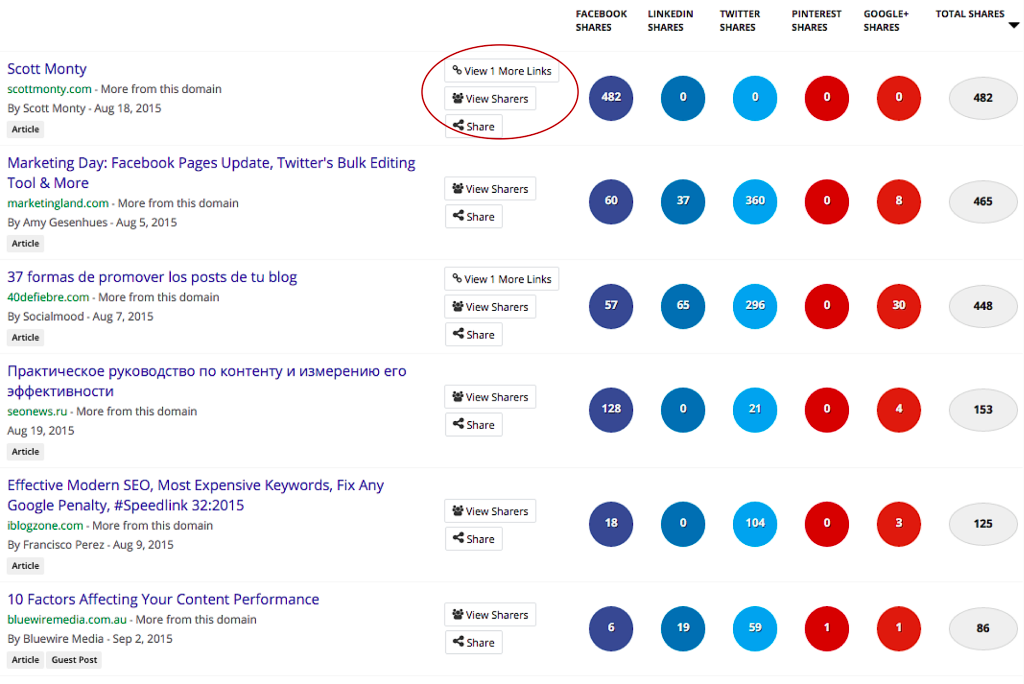 BuzzSumo makes your backlink research valuable by showing you only content backlinks—i.e. links to content from other pieces of content. Seeing the social share potential of the blog will also help you determine if it’s a quality website that will drive traffic to your own site.
Using the results from that report, reach out to the blog author as well as the author who created the link to the similar post and let them know about yours. You’ll have a higher rate of success if you aim for the most recent posts, as they are more likely to be recently updated, as well as posts from authors who write link roundups, like Marketing Day (shown in the search results above).
From here, start looking for additional link roundups in your industry. They will usually have keywords like:
BuzzSumo makes your backlink research valuable by showing you only content backlinks—i.e. links to content from other pieces of content. Seeing the social share potential of the blog will also help you determine if it’s a quality website that will drive traffic to your own site.
Using the results from that report, reach out to the blog author as well as the author who created the link to the similar post and let them know about yours. You’ll have a higher rate of success if you aim for the most recent posts, as they are more likely to be recently updated, as well as posts from authors who write link roundups, like Marketing Day (shown in the search results above).
From here, start looking for additional link roundups in your industry. They will usually have keywords like:
- [your topic] roundup
- best [your topic] links
- best [your topic] posts
- best [your topic] articles
- top [your topic] links
- top [your topic] posts
- top [your topic] articles, etc.
Answers
Last, but not least, look for ways to answer questions with links to your content. Search for these opportunities in Q&A networks like Yahoo Answers and Quora, forums, and social media groups. Not all of these arenas will create SEO links per say, but they will allow you to gain more exposure for your content in a helpful way. And more exposure has the potential to lead to more links.
Not all of these arenas will create SEO links per say, but they will allow you to gain more exposure for your content in a helpful way. And more exposure has the potential to lead to more links.
In Conclusion
Here is a quick rundown of the steps to building links with content:- Create linkable high-quality content that is valuable, accurate, up-to-date, complete, and 1,000+ words.
- Include specific research, expert opinions, and resources.
- Build social proof immediately after publishing by getting social shares, social votes, and comments.
- Get exposure through social advertising and social outreach to people who share similar content.
- Get links through direct outreach to people who link to similar content.
- Get links by answering questions on Q&A networks, forums, and social media groups.
Frequently Asked Questions (FAQs) about Link Building and Content Marketing
What is the importance of link building in SEO?
Link building is a crucial part of Search Engine Optimization (SEO). It involves acquiring hyperlinks from other websites to your own. Search engines like Google use these links to crawl the web; they will crawl the links between the individual pages on your website, and they will crawl the links between entire websites. Therefore, the more high-quality sites that link to you, the more likely you are to rank well in search results.
How can I start with link building for my website?
Starting with link building can seem daunting, but it’s all about creating valuable content and reaching out to relevant websites. Begin by creating high-quality, unique content that others will find valuable. Then, identify websites that are relevant to your industry and reach out to them, suggesting they might find your content useful for their audience.
What are some effective link building strategies?
There are several effective link building strategies. These include content creation and promotion, submissions to directories, guest blogging, and broken link building. Each of these strategies requires a different approach, but they all revolve around creating valuable content and building relationships with other websites.
How can I measure the success of my link building efforts?
You can measure the success of your link building efforts through various metrics. These include the number of new links you’ve acquired, the number of new referring domains, the relevance of the linking pages, and the impact on your website’s organic traffic.
What is the role of content in link building?
Content plays a crucial role in link building. High-quality, valuable content is more likely to attract high-quality links. By creating and promoting great content, you can attract links naturally, without needing to reach out to other websites.
How can I avoid penalties from search engines when link building?
To avoid penalties from search engines, it’s important to follow their guidelines for link building. This means avoiding tactics like buying links, participating in link schemes, or using automated programs to create links. Instead, focus on creating valuable content and building relationships with other websites.
What is the difference between internal and external links?
Internal links are links that go from one page on a website to a different page on the same website. External links, on the other hand, are links that go from one website to a different website. Both types of links are important for SEO, but they serve different purposes.
How can I use social media for link building?
Social media can be a great tool for link building. By sharing your content on social media, you can attract more attention to it, which can lead to more people linking to it. You can also use social media to build relationships with other websites and influencers in your industry.
What is a backlink and why is it important?
A backlink is a link from another website to your website. Backlinks are important because they signal to search engines that other websites find your content valuable. The more high-quality backlinks you have, the more likely you are to rank well in search results.
How long does it take to see results from link building?
The time it takes to see results from link building can vary. It depends on many factors, including the quality of your content, the relevance of the linking websites, and the competitiveness of your industry. However, link building is a long-term strategy, and it can often take several months to see significant results.
 Eric Siu
Eric SiuEric Siu is the founder of Growth Everywhere, a podcast where he interviews world-class entrepreneurs on business and personal growth. He is also the CEO of digital marketing agency Single Grain. You can follow Eric on Snapchat here.




